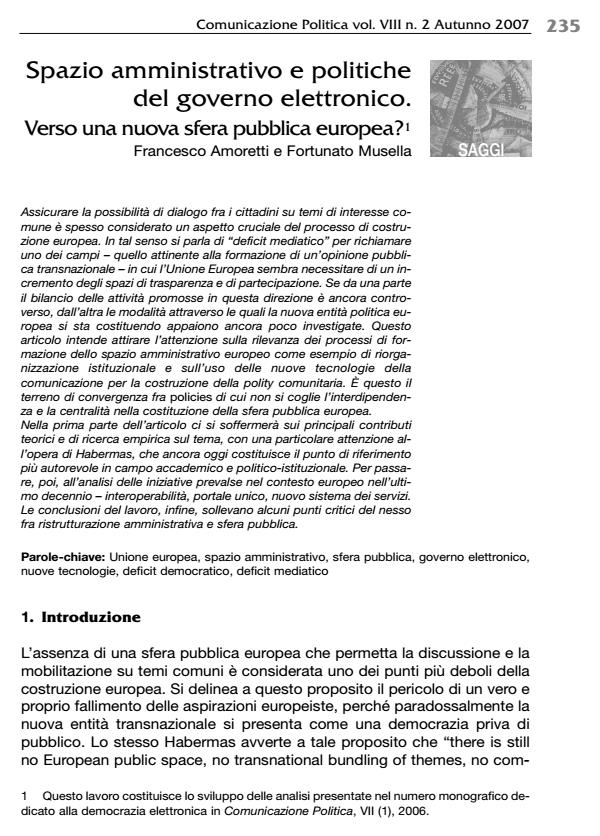Spazio amministrativo e politiche del governo elettronico. Verso una nuova sfera pubblica europea?
Journal title COMUNICAZIONE POLITICA
Author/s Francesco Amoretti, Fortunato Musella
Publishing Year 2008 Issue 2007/2
Language Italian Pages 18 P. 235-252 File size 122 KB
DOI
DOI is like a bar code for intellectual property: to have more infomation
click here
Below, you can see the article first page
If you want to buy this article in PDF format, you can do it, following the instructions to buy download credits

FrancoAngeli is member of Publishers International Linking Association, Inc (PILA), a not-for-profit association which run the CrossRef service enabling links to and from online scholarly content.
Dialogue among citizens on themes of common interest is often considered a crucial issue in the process of European construction. The media deficit strongly poses the challenge of the creation of a transnational public opinion for the need of larger spaces of transparency and participation. Many initiatives have been launched by the European institutions in order to reduce the distance between themselves and the European citizenry. Increasing the transparency of the political process, enhancing the direct involvement and participation of citizens, and improving the quality of opinion formation are among the main imperatives of the emerging European policy discourse. Yet the project of the European Union as a community of communication seems very far to be realized, and the modalities through which the European entity is really forming remain still to be investigated. In this article we will concentrate our attention on the building of a common European administrative space, taking it as an example of an institutional reorganization based on a widespread use of Icts. Indeed, it can been noted a relevant interconnection between the electronic government policy and the attempts of constructing the European Union. Our research will be divided in three main sections. The first portion will analyse the most important theoretical and empirical contributions on the field of European public opinion, with a particular focus on the Habermas’ works. The second part will address political goals and implementation patterns concerning new technologies developed in the European landscape during the last ten years. Finally, some critical remarks on the relationship between the process of administrative restructuring and the public sphere will been provided.
Francesco Amoretti, Fortunato Musella, Spazio amministrativo e politiche del governo elettronico. Verso una nuova sfera pubblica europea? in "COMUNICAZIONE POLITICA" 2/2007, pp 235-252, DOI: